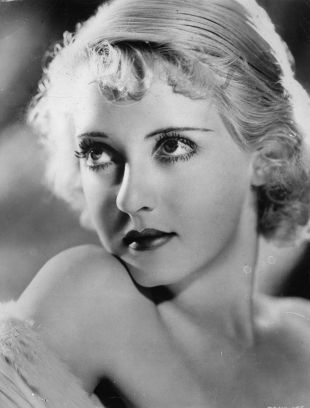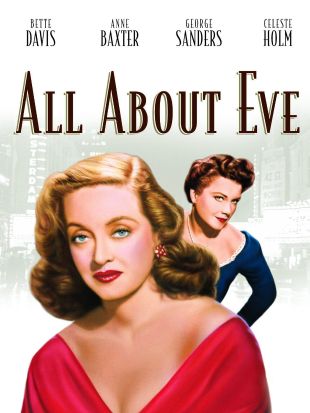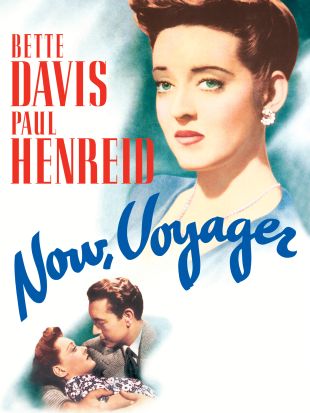The daughter of a Massachusetts lawyer, American actress Bette Davis matured with a desire to become an actress upon her graduation from Cushing Academy, but was turned away from Eva LeGallienne's Manhattan Civic Repertory in New York. Undaunted, Davis enrolled in John Murray Anderson's Dramatic School, where everyone (including classmate Lucille Ball) regarded her as the star pupil. After a 1928 summer season with director George Cukor's stock company in Rochester, NY (where she worked with future co-star -- and rival -- Miriam Hopkins), Davis went on to Broadway, starring in Broken Dishes and Solid South before Hollywood called. Dazzling on-stage, Davis was signed to a contract by Universal in 1930. After an unimpressive debut in Bad Sister in 1931, however, Davis was out of work, but picked up by Warner Bros. soon thereafter. Davis applied herself with white-hot intensity to becoming a star with that company, and after a major role in the 1932 George Arliss vehicle The Man Who Played God, a star she became. Still, the films at Warner Bros. were uneven, and it wasn't until the studio loaned out Davis to play the bravura role of Mildred in RKO's Of Human Bondage (1934) that the critics began to take notice.
An Oscar nomination seemed inevitable for her performance in Bondage, but Davis was let down by Warner Bros., which didn't like the fact that her best appearance had been in a rival's movie, and it failed to get behind her Oscar campaign (although there was a significant write-in vote for the actress). But, in 1935, Davis excelled as a self-destructive actress in the otherwise turgid film Dangerous, and an Oscar was finally hers. And when Warner Bros. subsequently failed to give Davis the top roles she felt she then merited, the actress went on strike and headed for England. She lost a legal battle with the studio and came back, but it acknowledged her grit and talent by increasing her salary and giving her much better roles. In 1939 alone, Davis starred in Dark Victory, Juarez, The Private Lives of Elizabeth and Essex, and The Old Maid. But she didn't get the plum role of the season -- Scarlet O'Hara in Gone With the Wind -- because Warner Bros. wouldn't loan her to David O. Selznick unless Errol Flynn was chosen to play Rhett Butler (a piece of casting both Selznick and Davis violently opposed). But Davis had already had her turn at playing a Southern belle in Jezebel (1938), which won her second a Oscar.
As her star status increased in the 1940s, Davis found that it would have to be at the expense of her private life -- she would be married and divorced four times, admitting toward the end of her life that her career came first, last, and always. A fling at being her own producer in 1946 was disappointing, and her contract with Warner Bros. petered out in 1949 with a string of unsuccessful films. Davis made a spectacular comeback in 1950 when she replaced an ailing Claudette Colbert in the role of Margot Channing in the Oscar-winning All About Eve. Though suffering from a bone disease that required part of her jaw to be removed, Davis continued to work in films throughout the '50s; but, in 1961, things came to a standstill, forcing the actress to take out a famous job-wanted ad in the trade papers.
In 1962, Davis began the next phase of her career when she accepted the role of a whacked-out former child star in What Ever Happened to Baby Jane? This led to a string of gothic horror films that did little to advance Davis' reputation, but kept her in the public eye. It was also in 1962 that Davis penned her thoughtful and honest autobiography The Lonely Life. Working in movies, TV, on-stage and on one-woman lecture tours into the '70s, Davis may have been older but no less feisty and combative; her outspokenness may have unnerved some of her co-stars, but made her an ideal interview subject for young film historians and fans. In 1977, Davis received a Lifetime Achievement Award from the American Film Institute, an honor usually bestowed upon performers who were retired or inactive. Not Davis. She kept at her craft into the '80s, even after a stroke imposed serious limitations on her speech and movement. Amidst many TV movies and talk-show appearances, Davis gave one last memorable film appearance in The Whales of August (1987), in which she worked with another venerable screen legend, Lillian Gish. Though plagued with illness, Davis was formidable to the end -- so much so that when she died in France at the age of 82, a lot of her fans refused to believe it.



